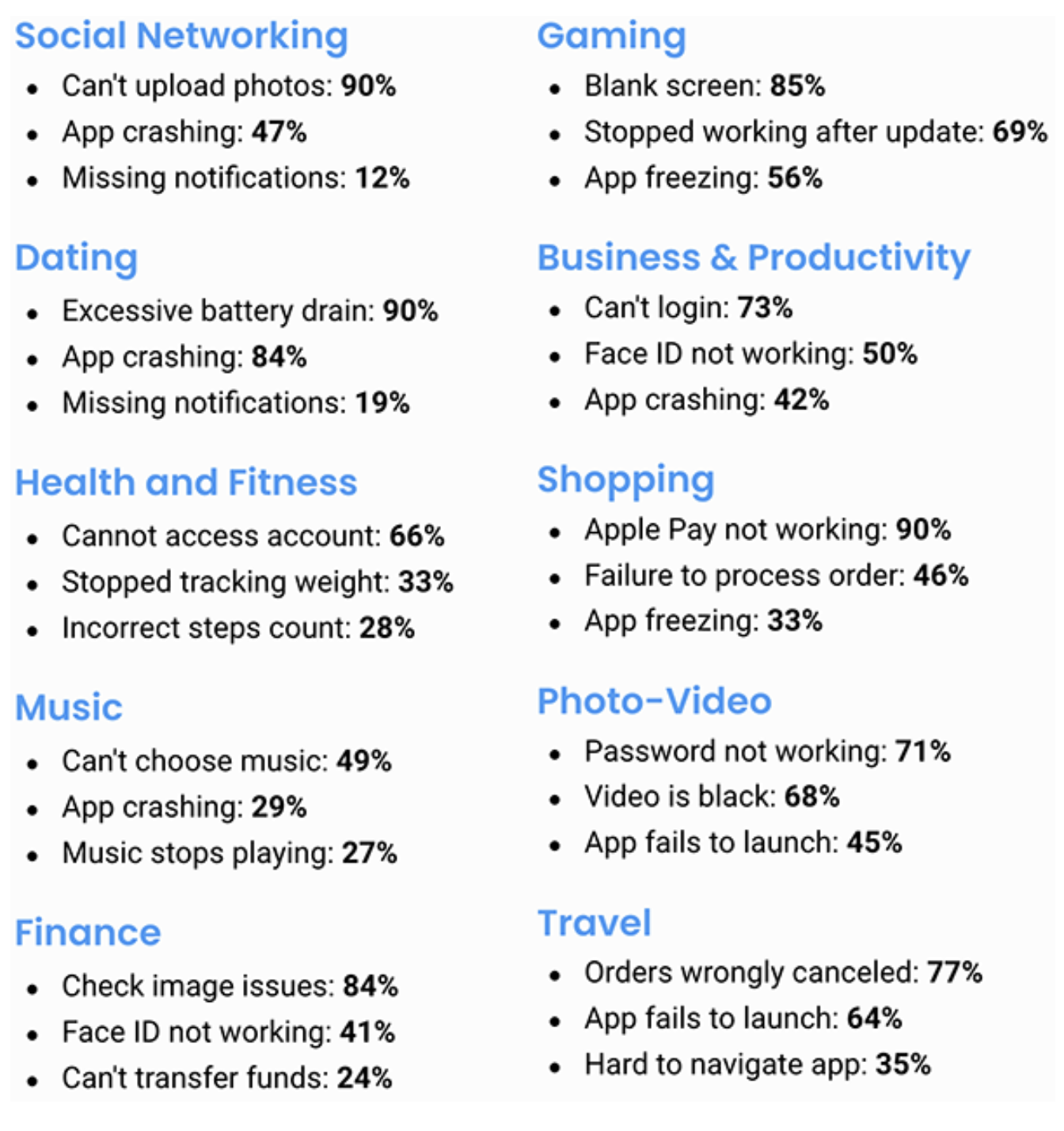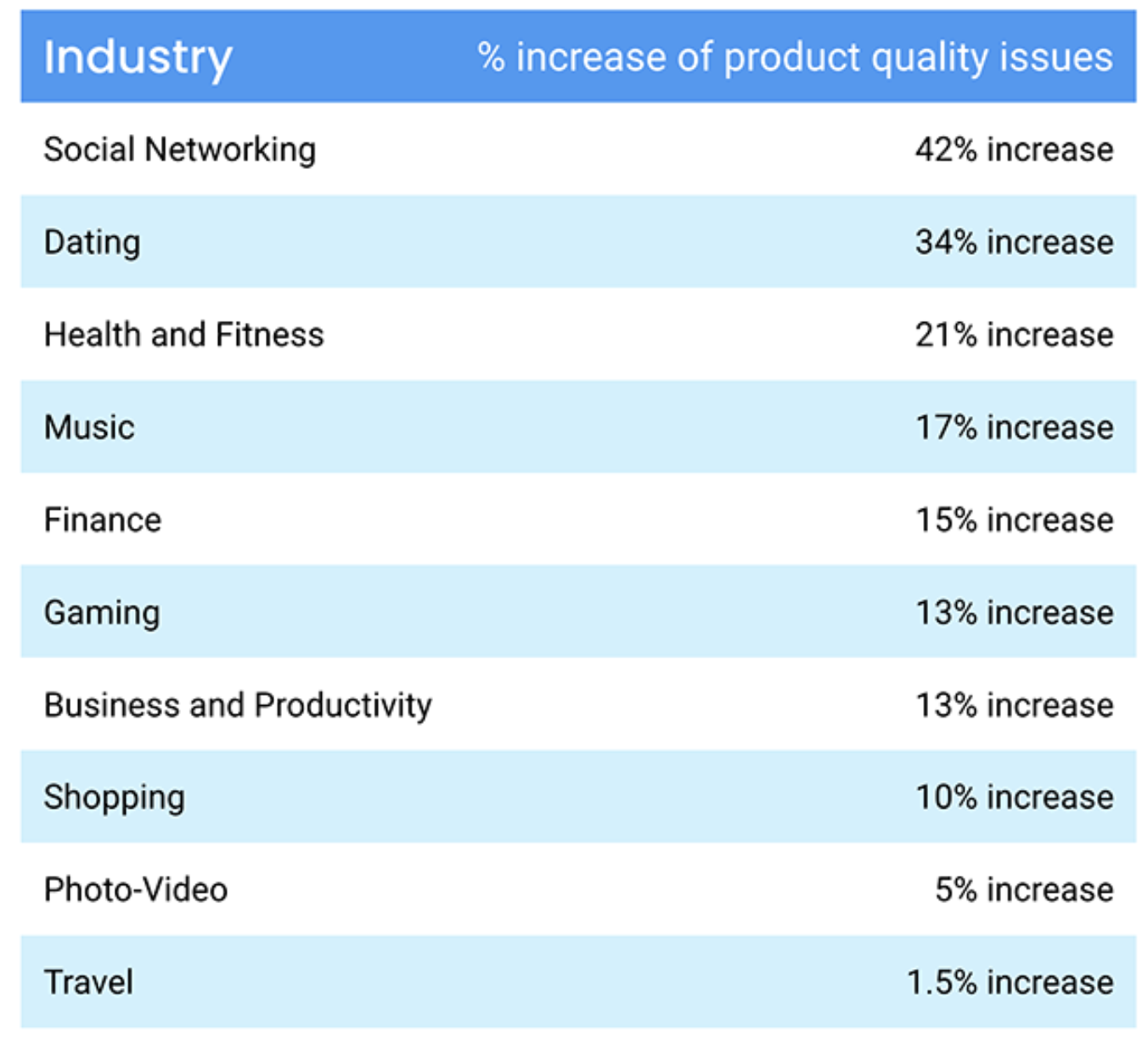Here are the bugs plaguing Apple mobile apps 3 weeks after iOS 16

Operating system upgrades are always a fraught time for app developers. Whenever a new version of an operating system is released, you have to test your app against it and try to make sure your app works smoothly. Despite your best efforts with testing, your app users who upgrade their OS are still likely to encounter issues.
Apple recently released iOS 16, and we analyzed tens of thousands of pieces of public user feedback from 4,800 mobile apps three weeks before the release and three weeks after the release. We wanted to find out what issues users were experiencing the most after the release went out. (We recently analyzed the main issues affecting users who upgraded to iOS 15.)
Bugs galore
In our iOS 16 analysis, we broke out results by the type of app — social networking, finance, shopping, etc. Social networking apps were hardest hit, with a 42% increase in product quality issues. (unitQ defines a quality issue as a type of user feedback that identifies a defect or bug in a product that affects user satisfaction.) Dating apps came in second place with more than a one-third increase in quality issues. Health and fitness apps settled in third place with 21% more issues.
When we look more closely at the specific issues users experienced the most, you find that social networking apps had a 90% spike in users being unable to upload photos, the bread and butter of social media. Business and productivity apps had a 73% increase in users being unable to log into the apps. And there was a 90% jump in issues with Apple Pay not working with shopping apps.
The chart below shows the percentage increase in major product quality issues users complained about in Apple App Store reviews three weeks after the release of iOS 16 compared to three weeks before the release, by selected industry:

Embrace unitQ data intelligence
unitQ Monitor provides organizations with the real-time insights and actionable intelligence necessary to identify and fix those product quality issues that are the top concerns for your users.
unitQ captures user feedback in more than 100 languages from dozens of sources — including the Apple App Store, Discord, Google Play Store, Reddit, Twitter, Facebook, Instagram, and YouTube, among others. unitQ also integrates with productivity tools such as Slack, PagerDuty, Zendesk and Jira.
With machine learning and AI, unitQ buckets user feedback into discernible product quality issues. unitQ customers like Spotify, Klarna, HelloFresh and Udemy harness this data to visualize how existing and new product features are impacting their users across regions, app versions, and operating systems — in real time. unitQ algorithms enable organizations to harness this real-time user feedback to take a measured, data-driven approach to their product quality efforts, fix issues faster, and leverage insights into roadmaps and product growth.
About the data for this study
For the purposes of this study, our charts are based on the ingestion of tens of thousands of iOS App Store reviews from more than 4,800 apps for the time period of three weeks before to three weeks after Apple’s release of iOS 16 on September 12, 2022.
Overall, social networking apps saw the biggest increase in users reporting product quality issues. Following social media were dating apps, health and fitness apps and so on.
The chart below shows the percentage increase in all product quality issues that users complained about in Apple App Store reviews three weeks after the release of iOS 16 compared to three weeks before the release, by selected industry:

How unitQ can help
unitQ provides organizations with real-time insights and actionable intelligence necessary to identify and fix product quality issues that are of top concern for end users. Alerts (especially our newly released anomaly alerts) help organizations detect product quality issues, including sudden aberrations from normal feedback volumes.
To learn more about unitQ and our latest anomaly alerts feature, request a demo.
Pete Bratach is unitQ documentation manager.